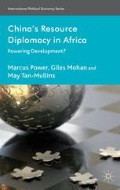Abstract
As early as October 2006, the Chinese State increasingly came to realize the scale of the domestic and global tasks that China would have to take on in terms of tackling environmental issues. Domestically, as we have seen, thirty years of reforms saw huge improvements in China’s economic development and living standards. However, China’s natural resources have been the subject of widespread exploitation with significant implications for the pollution of the natural environment as documented by scholars such as Economy (2004, 2005), Hayes (2007), Magee (2006) and Smil (1980, 1998, 2004). China now emits more CO2 than the United States and Canada put together and its emissions are up by 171 per cent since the year 2000 (EIA 2011). China’s insatiable appetite for natural resources to fuel its domestic growth and satisfy its domestic energy needs has thus left an unparalleled and increasing footprint on the world’s environment (Liu and Diamond 2005; Mol 2011). Shortages of domestic commodities and global oil price spikes in 2004, 2006 and 2007 has led China to increasingly turn to resource-rich regions such as Africa and central Asia in search of these resources and in the interests of energy security. China relies on coal, for example, for almost 70 per cent of its total energy supply, yet it is estimated that in 2020 the shortage of coal in China will reach 1 billion metric tons per year, with significant implications for domestic manufacturing businesses (Dickinson 2010).
In 20 years, China has achieved economic results that took a century to attain in the west. But we have also concentrated a century’s worth of environmental issues into those 20 years. While becoming the world leader in GDP growth and foreign investment, we have also become the world’s number one consumer of coal, oil and steel — and the largest producer of CO2 and chemical oxygen demand (COD) emissions … China is a socialist country and cannot engage in environmental colonialism, nor act as a hegemon, so it must move towards a new type of civilization. Ideas such as the scientific view of development and building a harmonious, resource-saving and environmentally-friendly society, as put forward by the Central Committee in recent years, have laid the foundation for doing so.
Mr Pan Yue, deputy director of the China State Environmental Protection Administration (SEPA), 27 October 2006
Access this chapter
Tax calculation will be finalised at checkout
Purchases are for personal use only
Preview
Unable to display preview. Download preview PDF.
Author information
Authors and Affiliations
Copyright information
© 2012 Marcus Power, Giles Mohan and May Tan-Mullins
About this chapter
Cite this chapter
Power, M., Mohan, G., Tan-Mullins, M. (2012). The Environmental Implications of China’s Rise in Africa. In: China’s Resource Diplomacy in Africa. International Political Economy Series. Palgrave Macmillan, London. https://doi.org/10.1057/9781137033666_7
Download citation
DOI: https://doi.org/10.1057/9781137033666_7
Publisher Name: Palgrave Macmillan, London
Print ISBN: 978-1-349-31049-4
Online ISBN: 978-1-137-03366-6
eBook Packages: Palgrave Political & Intern. Studies CollectionPolitical Science and International Studies (R0)

